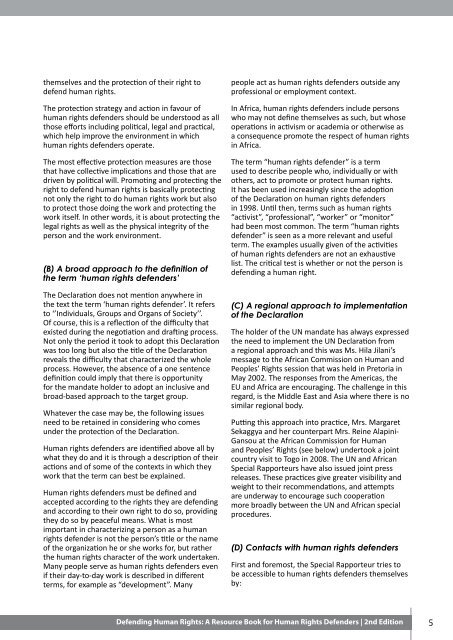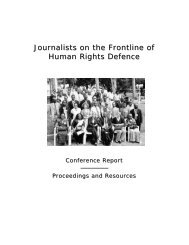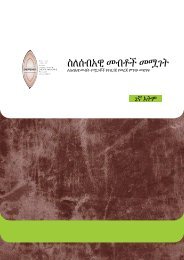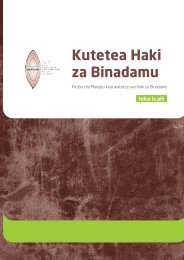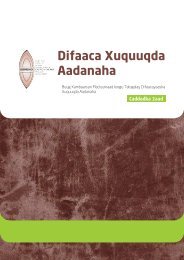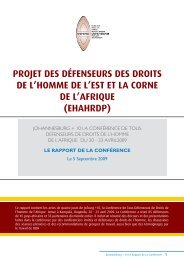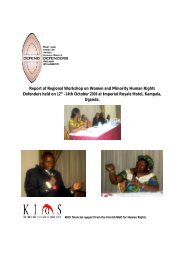Defending Human Rights: A Resource Book for Human
Defending Human Rights: A Resource Book for Human
Defending Human Rights: A Resource Book for Human
Create successful ePaper yourself
Turn your PDF publications into a flip-book with our unique Google optimized e-Paper software.
themselves and the protection of their right to<br />
defend human rights.<br />
The protection strategy and action in favour of<br />
human rights defenders should be understood as all<br />
those ef<strong>for</strong>ts including political, legal and practical,<br />
which help improve the environment in which<br />
human rights defenders operate.<br />
The most effective protection measures are those<br />
that have collective implications and those that are<br />
driven by political will. Promoting and protecting the<br />
right to defend human rights is basically protecting<br />
not only the right to do human rights work but also<br />
to protect those doing the work and protecting the<br />
work itself. In other words, it is about protecting the<br />
legal rights as well as the physical integrity of the<br />
person and the work environment.<br />
(B) A broad approach to the definition of<br />
the term ‘human rights defenders’<br />
The Declaration does not mention anywhere in<br />
the text the term ‘human rights defender’. It refers<br />
to ‘’Individuals, Groups and Organs of Society’’.<br />
Of course, this is a reflection of the difficulty that<br />
existed during the negotiation and drafting process.<br />
Not only the period it took to adopt this Declaration<br />
was too long but also the title of the Declaration<br />
reveals the difficulty that characterized the whole<br />
process. However, the absence of a one sentence<br />
definition could imply that there is opportunity<br />
<strong>for</strong> the mandate holder to adopt an inclusive and<br />
broad-based approach to the target group.<br />
Whatever the case may be, the following issues<br />
need to be retained in considering who comes<br />
under the protection of the Declaration.<br />
<strong>Human</strong> rights defenders are identified above all by<br />
what they do and it is through a description of their<br />
actions and of some of the contexts in which they<br />
work that the term can best be explained.<br />
<strong>Human</strong> rights defenders must be defined and<br />
accepted according to the rights they are defending<br />
and according to their own right to do so, providing<br />
they do so by peaceful means. What is most<br />
important in characterizing a person as a human<br />
rights defender is not the person’s title or the name<br />
of the organization he or she works <strong>for</strong>, but rather<br />
the human rights character of the work undertaken.<br />
Many people serve as human rights defenders even<br />
if their day-to-day work is described in different<br />
terms, <strong>for</strong> example as “development”. Many<br />
people act as human rights defenders outside any<br />
professional or employment context.<br />
In Africa, human rights defenders include persons<br />
who may not define themselves as such, but whose<br />
operations in activism or academia or otherwise as<br />
a consequence promote the respect of human rights<br />
in Africa.<br />
The term “human rights defender” is a term<br />
used to describe people who, individually or with<br />
others, act to promote or protect human rights.<br />
It has been used increasingly since the adoption<br />
of the Declaration on human rights defenders<br />
in 1998. Until then, terms such as human rights<br />
“activist”, “professional”, “worker” or “monitor”<br />
had been most common. The term “human rights<br />
defender” is seen as a more relevant and useful<br />
term. The examples usually given of the activities<br />
of human rights defenders are not an exhaustive<br />
list. The critical test is whether or not the person is<br />
defending a human right.<br />
(C) A regional approach to implementation<br />
of the Declaration<br />
The holder of the UN mandate has always expressed<br />
the need to implement the UN Declaration from<br />
a regional approach and this was Ms. Hila Jilani’s<br />
message to the African Commission on <strong>Human</strong> and<br />
Peoples’ <strong>Rights</strong> session that was held in Pretoria in<br />
May 2002. The responses from the Americas, the<br />
EU and Africa are encouraging. The challenge in this<br />
regard, is the Middle East and Asia where there is no<br />
similar regional body.<br />
Putting this approach into practice, Mrs. Margaret<br />
Sekaggya and her counterpart Mrs. Reine Alapini-<br />
Gansou at the African Commission <strong>for</strong> <strong>Human</strong><br />
and Peoples’ <strong>Rights</strong> (see below) undertook a joint<br />
country visit to Togo in 2008. The UN and African<br />
Special Rapporteurs have also issued joint press<br />
releases. These practices give greater visibility and<br />
weight to their recommendations, and attempts<br />
are underway to encourage such cooperation<br />
more broadly between the UN and African special<br />
procedures.<br />
(D) Contacts with human rights defenders<br />
First and <strong>for</strong>emost, the Special Rapporteur tries to<br />
be accessible to human rights defenders themselves<br />
by:<br />
<strong>Defending</strong> <strong>Human</strong> <strong>Rights</strong>: A <strong>Resource</strong> <strong>Book</strong> <strong>for</strong> <strong>Human</strong> <strong>Rights</strong> Defenders | 2nd Edition 5


